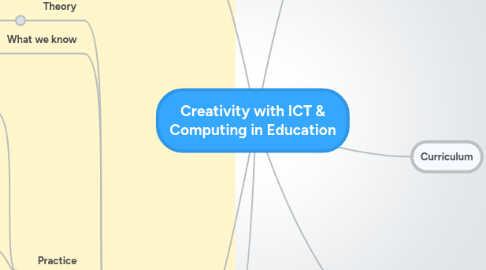
1. Computing
1.1. Theory
1.1.1. Algorithms
1.1.2. Computer Science
1.2. What We Know
1.2.1. Draft National Curriculum Programmes of Study
1.2.1.1. Responses to Consultation on draft POS
1.2.1.1.1. Naace
1.2.1.1.2. BCS/CAS
1.2.1.1.3. Vital
1.2.1.1.4. Cambridge Primary Review
1.2.1.2. MirandaNet Paper
1.2.2. ICT is redefined as Computing in National Curriculum
1.2.2.1. ICT v Computing argument is a straw man
1.2.2.2. ICT v Computing argument is a straw man
1.2.3. Mesh Guides would fit here
1.3. Practice
1.3.1. Computational thinking
1.3.2. Coding / Programming
1.3.2.1. Visual
1.3.2.2. Text based
1.4. Issues
1.4.1. ICT staff confident to teach
1.4.2. CPD
1.4.3. Issues with terminology at Primary (and beyond)
1.5. Resources
1.5.1. Online Programming tools
1.5.1.1. Scratch
1.5.1.2. Alice
1.5.1.3. CodeAcademy
1.5.2. CAS website
1.6. Creativity
2. Digital Literacy
2.1. Theory
2.1.1. Computers in Society
2.2. What we know
2.3. Practice
2.3.1. Computer Skills
2.3.1.1. Software applications
2.3.1.2. Select appropriate devices for task
2.3.2. Web SKills
2.3.2.1. Making
2.3.2.2. Sharing
2.3.2.3. Publishing
2.3.2.4. set up collaborative spaces
2.3.2.5. Search Skills
2.3.2.6. Search Skills
2.3.3. Web Literacy
2.3.3.1. eSafety
2.3.3.2. Web economics
2.3.3.3. Information/data
2.3.4. Media Literacy
2.4. Issues
2.4.1. No accepted consensus or or formal definition of DL
2.4.2. Accessability
2.5. Resources
2.5.1. DML Hub
2.5.2. Belshaw 8c's of Digital Literacy
2.5.3. Mesh
3. Creativity
3.1. Theory
3.2. What we know
3.3. Practice
3.3.1. Outcomes
3.3.1.1. Make
3.3.1.2. Remix
3.3.1.3. Share
3.3.1.4. Publish
3.3.1.5. Curate
3.3.2. Opportunities
3.3.2.1. links with professional & Industry practice
3.3.3. Technology in Education
3.3.4. Examples (add names - Institutions)
3.4. Issues
3.5. Resources
4. Assessment
4.1. Theory
4.1.1. Formative
4.1.1.1. Project based
4.1.2. Summative
4.1.2.1. Summative Tests
4.1.2.1.1. Multiple choice
4.1.2.1.2. Practical test
4.2. What we know
4.3. Resources
4.4. Practice
4.4.1. Certification
4.4.1.1. GCSE
4.4.1.1.1. A Level
4.4.1.2. eBac
4.4.2. Badges
4.4.2.1. Open Badges (mozilla)
4.5. Issues
5. CPD
5.1. Theory
5.2. What we know
5.2.1. Current research suggests there is an acute shortage of teachers with the experience to teach Computing
5.2.2. Current Information many (ICT) teachers not confident to teach Computing POS
5.2.3. Changing definition of teachers fro ICT to Computing
5.3. Practice
5.3.1. (Possible) Providers
5.3.1.1. CAS
5.3.1.2. Vital
5.3.2. Educational / Communities
5.3.2.1. Local Clusters
5.3.2.2. School Hubs
5.3.2.3. Teachmeets
5.3.2.4. Online
5.3.3. Online
5.3.3.1. Formal
5.3.3.1.1. Organised specifically for NC POS
5.3.3.2. Informal (open Web)
5.3.3.2.1. CodeAcademy
5.3.3.2.2. Mozilla Webmakers
5.3.3.3. Mooc Format
5.3.4. Blended
5.3.5. Teacher Voice
